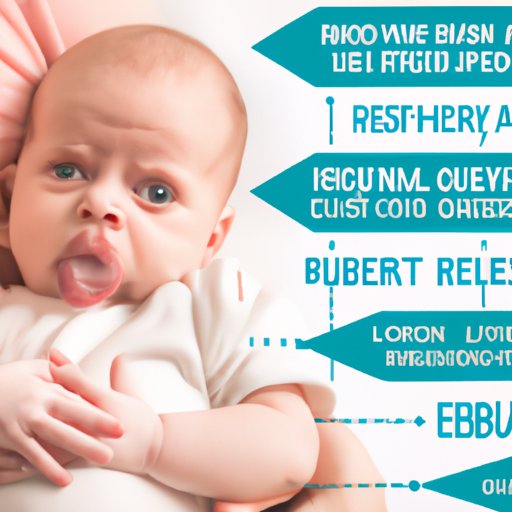Introduction
As a new parent, you may have noticed your little one spitting up after a feeding. While it is a common occurrence, excessive spitting up can be a source of concern for parents. This article aims to provide helpful information and solutions for parents dealing with infant reflux.
Understanding Infant Reflux: Common Causes and Solutions for Frequent Spitting Up
Infant reflux, or gastroesophageal reflux (GER), occurs when stomach contents flow back up into the esophagus. It is a common occurrence in infants, usually occurring after feedings. Unlike vomiting, it is not forceful and does not cause discomfort for the baby.
The common causes of reflux include underdeveloped esophageal sphincter, overfeeding, and lying flat on the back. A baby’s esophageal sphincter, which acts as a valve between the esophagus and stomach, is not fully developed, making it easier for stomach contents to flow back up. Overfeeding can also cause reflux, so try feeding smaller amounts more frequently to reduce the amount of food in the baby’s stomach. Lying flat on the back can also contribute to reflux. Try keeping your baby upright after feedings and placing them on their back only when putting them to sleep.
There are several solutions for managing reflux, including burping, upright feeding positions, and smaller, more frequent meals. Burping your baby after feedings can help release trapped air and reduce the chances of reflux. Upright feeding positions, such as holding your baby at a 45-degree angle, can also help prevent reflux. Feeding your baby smaller, more frequent meals can help reduce the amount of food in their stomach at any given time.
The Truth About Spit-Up: Dispelling Myths and Providing Helpful Tips for Parents
There are many myths surrounding infant spit-up that can make parents worry unnecessarily. It is important to understand that spitting up is a normal occurrence and does not necessarily mean something is wrong with your baby.
Some myths surrounding infant spit-up include the idea that it is a sign of a serious health problem or that it indicates a need for formula supplementation. However, most babies outgrow reflux by their first birthday, and breast milk or formula will provide adequate nutrition for your baby.
With that said, there are still tips and tricks parents can use to manage spit-up. Using bibs and burp cloths can help protect clothing and furniture from spit-up. Avoiding tight or restrictive clothing can also help prevent reflux. Elevating the head of the crib can also help reduce the chances of spit-up while your baby is sleeping.
Could It Be an Allergy? Investigating the Link Between Food Sensitivities and Baby Spit-Up
If your baby continues to spit up excessively, it may be worth investigating the possibility of a food allergy or sensitivity. A food allergy or sensitivity can cause excessive spitting up in infants. Common allergens that may be causing the issue include dairy, soy, and wheat. It is important to work with your healthcare provider to identify and manage any food allergies or sensitivities.
There are several methods for testing and diagnosing a food allergy or sensitivity, including elimination diets and allergy tests. It is important to consult with your healthcare provider before trying any elimination diets or making significant changes to your baby’s diet.
What Your Pediatrician Might Not Tell You: Natural Remedies for Managing Excessive Spit-Up
While there are prescription medications available to manage reflux, some parents may prefer to explore natural remedies before resorting to medication.
Probiotics may be helpful in reducing reflux symptoms. Chiropractic care may also provide relief by addressing alignment issues that may be causing discomfort. Herbal supplements such as chamomile or ginger may also provide relief. However, it is important to consult with a healthcare provider before trying any natural remedies and to ensure they are safe for your baby.
Navigating the Challenges of Breastfeeding with a Spit-Up Baby: Expert Advice for Troubleshooting
Breastfeeding mothers may face additional challenges when their baby has reflux. Milk oversupply can contribute to reflux, as can latch issues.
If you are experiencing a milk oversupply, you may consider pumping before feedings to reduce the amount of milk your baby takes in at each feeding. Breast compression can also help reduce the amount of milk your baby takes in while still maintaining milk flow.
If your baby is having trouble latching, seeking guidance from a lactation consultant can be helpful. A lactation consultant can provide guidance on proper latch techniques and positions to help reduce reflux symptoms.
Conclusion
Excessive spit-up can be a source of concern for parents, but it is a common occurrence in infants that can usually be managed with simple solutions. Remember to consult with your healthcare provider if you have any concerns about your baby’s health. Seeking guidance and support from healthcare providers and other parents in similar situations can also be helpful.
